- Home
- Peter Carey
Jack Maggs Page 14
Jack Maggs Read online
Page 14
“Has not the money always come, Mary? Have I not looked after you? Do you not like your new home?”
“Lizzie likes it.”
“And you?”
“I dare not like it.”
“Why not?”
“I know we will have to leave it.”
“What nonsense, my darling. Do not say that. If we leave it, it will be to a better home still.”
“But what am I to say when the butcher will not even give us tripe until something is paid off the account?”
“Oh please, dearest, it is after midnight.”
“And the grocer, Heaven help me, they will not see me in the shop. Please Toby, will you go to Brighton?”
“Brighton?”
“Yes, for the Chronicle.”
“Lord help me. How did my father know this?”
“It is five pounds and expenses, and it will only take the day. Please, Toby. You could write in the coach as you did coming back from Leeds.”
“Mary, you have been reading my telegram.”
“It was lying open on your desk. What am I to do? Surely you could abandon your magnets for one day.”
“You think I have no idea of money?”
“No, my dear, I know you have a very good idea of money. You are very clever with money, but we have none.”
While it did not please Tobias that his wife should talk to him like this, he liked it even less that she was right. He could not possibly tell her that he would do as she had asked and so, even as he went to his office to pack his yellow attaché case for Brighton, she did not have any idea that he had capitulated; the young woman stayed in the dark room with her eyes wide open wondering what meal could be made from sago and potatoes.
32
JACK MAGGS OPENED HIS EYES and saw, as he did every morning, the mortal stains which the attic’s previous inhabitant had left upon its melancholy walls.
The late Mr Pope’s room was a depressing little hole, and so far removed from the mansion Jack had left behind in Snail’s Bay that he was angry and insulted before he was properly awake.
He stirred his bellicose bulk inside the bed, but when he finally swung his heavy stockinged legs free of the blankets, he was rewarded with the sound of an empty grog bottle crashing to the floor. BLACK SEAL SPECIAL SCOTCH WHISKY, courtesy of Mr Buckle’s cellar. He sat with his head in his hands and watched it roll beneath the washstand.
Late the previous night he had gone in search of a second of the same, and had been caught by the master of the house. Drunk, he had insulted his host’s Trafalgar Doulton. Belligerent, he had as good as confessed himself a crook.
Now he rose from bed, seeing clearly to what degree his safety depended on the other’s good will. Thus, very wearily, he managed to make himself a footman once again. He shaved with cold water in the chipped pudding bowl provided. He sponged his livery as best he could, that is to say, not well at all. He wet his hair and tried to make a new order of it, finally resorting to a great deal of powder which did little to hide the damage to its architecture. All this time it was on his mind that he must smooth things over with his benefactor, and so he limped off down the stairs wishing with all his heart to make himself agreeable.
As he came down the back stairs he saw Mercy Larkin leave the dining room. He crept along the hallway a little, then hesitated.
“Jack Maggs? Is that you, Jack Maggs?”
It was the master calling from the dining room.
“Yes, Sir,” he answered. “Coming, Sir.” But when he came into Percy Buckle’s presence, he was dismayed to find him now very icy in his manner.
“Stand over there,” said Percy Buckle imperiously. “Against the wall.”
This, no matter what the stakes, was a very hard sort of order for Jack Maggs to take.
“I was on my way down to the kitchen.”
“I dare say you were. Against the wall.”
Jack Maggs moved back, but he could not make himself go all the way to the wall.
“What else, Sir?”
Percy Buckle chose not to notice the resistance. “You will see I am eating,” he said. He did not address Maggs directly; and indeed, had he not raised his papery voice a little, he might have given the impression that he was speaking to himself. “You will see I am eating my kipper from the poor old Trafalgar Doulton.”
There was then an exceptionally long silence during which it became clear just how insulted Mr Buckle felt himself. He should not have been insulted, Jack thought: the silver on the breakfast table accurately fulfilled his prediction of the night before. That is, it was not worth the trouble stealing. Of this low quality, however, Percy Buckle seemed to remain as ignorant as ever. He sat at his table sipping milky tea, occasionally feeding a pinch of kipper to the marmalade cat which whined round his legs.
At length he announced, “You will not be visiting Mr Oates this morning.”
“Oh. Why’s that, Sir?”
“That ain’t your affair, Jack Maggs.”
Now Jack Maggs did not wish to argue again. He wished only to be agreeable, but just the same he was rattled to find his Mesmerism cancelled. He could not waste a day.
“With respect, Sir,” he began.
“Respect, Jack Maggs, now there’s a thing.”
“Aye, it is. It is a great thing, Sir.” If his smile was strange, it was not his intention that it be so. He wished only to demonstrate good will. “But I have a bargain with Mr Oates and I had hoped he would respect it. Here I am, aren’t I? I am waiting for him.”
“A gentleman of leisure.”
“Oh, I know I ain’t a gentleman, Sir. I am a servant and I don’t have no leisure as it were, but I exchanged him two weeks of my life, Sir. That was my bargain with him. If the gentleman is not to call me for two days, it must be at his own cost. I am going to count those days as taken.”
“But what of your bargain with me?”
“I got no quarrel with you, Sir. You are as fine a master as ever were. My bargain was with Mr Tobias Oates.”
Percy Buckle then made a great show of adding sugar to his tea and stirring it. When this was completed to his satisfaction he solemnly laid his spoon upon his saucer.
“Jack Maggs, you wear my livery.”
“Yes, I do, Sir. Proudly, Sir, and that’s a fact.”
Percy Buckle patted at his moustache with his napkin. “Then I would require the respect a man in your position should show to one in mine.”
“A good point, Sir, but what exactly do you mean?”
“A man in your position,” began the master.
“That’s it,” interrupted Jack Maggs. “What mean you by that part? Let’s call a spade a spade, Sir. Let’s admit it: you saw my back.”
But Mr Buckle could not admit any such thing. Indeed, it now appeared that he could not say anything at all. Instead he began to spread butter on his previously abandoned crusts. He devoted a great deal of attention to this task and when he finally spoke he was still at it, laying on the butter like wet mortar on a brick. “Our bargain is that you are my footman. And for my part, I would like your respect, Jack Maggs.”
“Yes, Sir.”
“That is satisfactory to you?”
“Oh yes, Sir. It is.”
“And seeing as how you now have free time today, I would like you to clean my silver.”
“Yes, Sir.”
“You will find all the necessary rags in Mr Spinks’s little parlour. Mrs Halfstairs will direct you.”
“Meanwhile, Mr Buckle, you have what I might call my little secret.”
But Mr Buckle would not tangle with that question.
“Everything is kept where it should be, Maggs. You need not fear.”
“What do you mean by that?”
Percy Buckle finally looked up and, for the first time in their entire transaction, held his footman’s gaze.
“I mean,” said he, “you need not fear.”
And on the uncertain strength of that assurance, Jack Maggs departed.
“Good day,” said Constable, sitting himself down.
The other nodded sullenly, and began to brush some Oakey’s on a very dumpy looking Georgian tea pot.
Constable rested his sharp elbows conversationally upon the table.
“You are not a servant, Mr Maggs,” he said. “You make yourself miserable in acting like one.”
Jack Maggs listened carefully.
“You came to Great Queen Street with an ‘attachment’ to Henry Phipps. When he was not here, you decided to stay and watch for him.”
Still Jack Maggs stayed silent.
“I can find your man, if you should like me to.”
“You can find Henry Phipps?”
“Dear Mr Maggs, it is not something I would recommend.”
This was said very gently, with the utmost consideration, but it had the most obvious effect of offending Jack Maggs.
Said Constable, “May I inquire about the nature of your ‘attachment’ to the gentleman?”
“Personal,” said the other coldly.
“Then I would abandon that attachment.”
“Oh, you would, would you, mate?”
Constable did not quite sigh, but his shoulders dropped a fraction and he lapsed into a rather melancholy silence which was not without a certain power.
“You know him well?” Maggs finally asked.
“I know friends of his, yes.”
“They can take me to him?”
“One would not just drop in on the gentleman, Mr Maggs.”
“Then you can deliver a letter to him?”
“It is quite probable.”
“Your friends would bring me Mr Phipps’s reply, or take me to him?”
“If my friends can find him, they’ll deliver your note. I can’t say more than that.”
“It is more than a note. Tell your friends to say that Jack is waiting. Tell him that I continue to wait. No, not that. Say only that they have certain papers for him—I’ll give them the papers before they set off—and that they will wait while he reads them. Would they wait an hour, your friends? I’d pay them well.”
Constable smiled wanly. “My friends are my friends. They will not require payment, Mr Maggs.”
“You are in touch with them directly?”
“I shall meet with them on Monday.” The footman rose wearily. “On my day off.”
But Monday was three days away. It was impossible that Jack Maggs should stay three days.
33
TYPICALLY, MERCY HAD managed to overhear a great deal of the conversation between Mr Buckle and Jack Maggs, and although she had not re-entered the dining room until the latter had been abruptly dispatched to clean the silver, she knew that Jack Maggs had carelessly disclosed the information she had passed on: that is, that the scars on his back had been seen.
As she set a fresh tea pot upon the cluttered breakfast table she knew that the master could be in no doubt as to the identity of the gossip. He was a generous man, but very spiteful when crossed, and as she took his empty cup from him she feared she was in danger of being cast out of the house.
She was a proud young woman, and extremely particular about who she waited upon and why. Yet when it came to retaining her benefactor’s good opinion, she was prepared to jettison self-respect completely.
Her only hope in the present instance was that Mr Buckle might show the full blaze of his temper, and plainly charge her with her crime. Then she might, if not deny it, at least beg his pardon. She would lick his boots, and like the taste of it. She would make herself a worm and crawl into his ear. She would slide along his very veins and curl up inside the red wash of his angry little heart. But when she set the cup of tea before him, the master brought his cold, strange cat eyes to bear on her, and then she saw he would not lose his temper. He would not even name her misdemeanour.
He said it was a very nice sort of day.
It was not a nice day at all. It was grey and drizzling.
He said he had had quite enough to eat. He pushed his chair back and, having given her another thin-lipped smile, left the room. The wretched condition of the kipper on his abandoned plate confirmed the severity of his upset.
Mercy had always loved this dining room with its great round table and its amber and violet stained-glass windows. Sometimes, when she waited on the master, she liked to fancy that the day had come when she was finally Mrs Buckle. When the world outside was very wet or windy, there was a particularly deep pleasure to be had simply in standing behind that unbending little back and, with her hands hidden behind her, making a firm circle where her wedding ring might one day be.
Now, as she stacked the cutlery and china on her tray, she remembered the slum she had inhabited in Fetter Lane. The thought of being destined for such a place once more produced a dreadful feeling in her bowels. She would rather die than return to that life, and while she could not undo her indiscretion, she knew she must straight away explain her personal situation to Jack Maggs. He must never place her so at risk again.
In the scullery Miss Mott was cutting up the liver, but Mercy barely noticed her. She began to wash the dirty dishes, then abandoned them. She could think of only one thing: she must tell Jack Maggs to keep his mouth shut. If he revealed her visits across the roof, she would be undone for ever.
She therefore hurried off down the passageway to the room where she knew he was engaged. She came around a dog-leg and found the moon-faced housekeeper counting the preserve bottles in the passageway.
“Yes, Mercy?”
“I’ve come for lemon skins. For the brass in the dining room, Mum.”
Mrs Halfstairs gave her two very mouldy halves of lemon rind. Mercy could not think of a story which would get her round the housekeeper, and now she was a victim of the story she had already invented. She must return to the dining room and do the brass.
In the dining room, she discovered that Mr Makepeace was now set up with the master at the table. Mr Makepeace was the lawyer who had brought Mr Buckle his Great Good Fortune, and now it seemed it had been Mr Makepeace’s Great Good Fortune too, for his accounts were constantly being dropped through the letter box by his hobble-legged boy. He himself was a young man, in his twenties. As to what his features were, it is hard to say, for the distinctive quality of mouth and chin and nose were swallowed in the sea of his great corpulence. Even his voice seemed affected, for all that escaped the gravity of the body was an exhausted high-pitched whisper which made him rather hard to hear. Mercy set the lemon skins aside, and moved closer to the conversation.
“Luck or fortune,” said Mr Makepeace, “but in either case, it seems I have found your felon in the very first volume.”
There were crumbs on the floor below the table, and Mercy, having no whisk or pan, now counterfeited those implements with her hands.
“It is Maggs with two gs,” whispered Mr Makepeace. “There is a Mags with one g in 1813, but he is a forger from Sheffield.”
Good Jesus, thought Mercy.
“I do not know about the gs,” said Mr Buckle, “but he is a Londoner, no doubt about it.”
“Then I have the rascal,” said Mr Makepeace.
Mercy looked up across the top of the table to see him place a large leather-bound volume on the reading stand.
To discuss Jack Maggs with a man of law seemed, to Mercy, a very dangerous thing. To her, a lawyer was of the same species as a judge, and the judge the same genus as a policeman, and a policeman the same thing exactly as Harold Hoban, the hangman at Newgate Prison. So agitated was she by this conversation that she quickly withdrew into the hallway. Here there were a great many small engravings, each of which she now vigorously dusted and straightened, until this upsetting intercourse had finished and the visitor departed.
When Mr Makepeace had gone, Mr Buckle did not call for her. This confirmed her fears: he was ver
y angry with her.
She therefore began slowly to edge her way back into his presence, as though compelled by the requirements of her labour. She arrived finally at the hall-side door, and there she was, attacking the brass door knobs, when the cause of all her trouble came thundering up the stairs and burst into the dining room.
“This is wrong!” cried Jack Maggs, waving a tin of Oakey’s silver polish in the air.
It was only at this moment that she saw clearly what a dreadful liability he had become. She watched her master take the can of Oakey’s and peer down at the label.
“If it is silver . . . I,” began Percy Buckle.
“Who gives a frig for silver? You have not been straight with me.”
The master then produced his icy smile. “I not straight with you?”
“Now I hear my history is known to Mr Constable.”
Dear Jesus, here’s trouble.
“Do you have him in the room when I am naked? And her?” He pointed a finger to the doorway where Mercy was rubbing the lemon round and round, feeling the blood fill her neck and ears whilst the brass shone bright and yellow.
“Do you invite her in to see my shame?”
“Sit down, Maggs.”
“Stand or sit, you’ll get me hanged.”
“Hanged? Ah, there you are wrong, Sir.”
Jack Maggs sat, not on the chair indicated by Mr Buckle, but on the table. He rubbed his face with both his hands.
The master did not respond to this impudence, but sat himself in his chair and opened the hefty volume that Mr Makepeace had brought him. “I took the liberty of engaging my friend Mr Makepeace of Lincoln’s Inn.”
Oh Lord, this is worse.
Mr Buckle calmly placed his reading glasses on the end of his sharp nose and began to peer very closely at the pages of his book. “We have this morning, together, examined your sentencing and Mr Makepeace has made himself well acquainted with the law as it pertains to your situation . . .”
“My situation is my own damn business.”
“There is a Jack Maggs of London transported for life in 1813. Might that be your situation, Sir?”
It was heart-wrenching to witness the effect this announcement had upon this manly man. His shoulders slumped. He shook his great head slowly.

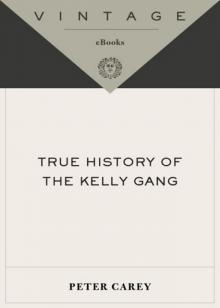 True History of the Kelly Gang
True History of the Kelly Gang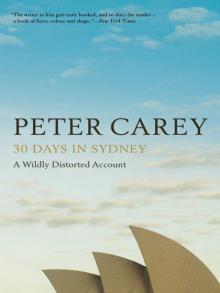 30 Days in Sydney: A Wildly Distorted Account
30 Days in Sydney: A Wildly Distorted Account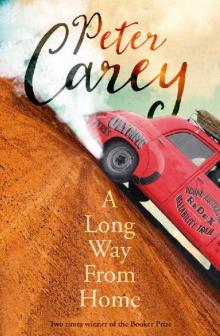 A Long Way From Home
A Long Way From Home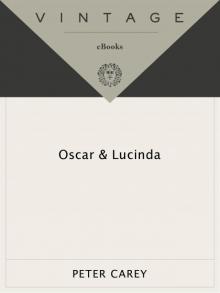 Oscar and Lucinda
Oscar and Lucinda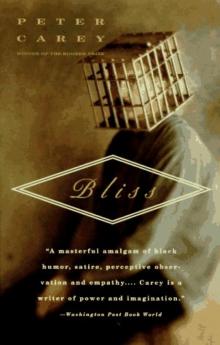 Bliss
Bliss Wrong About Japan
Wrong About Japan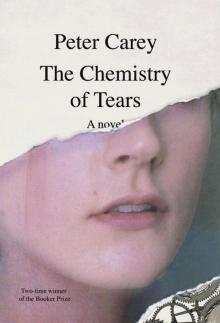 The Chemistry of Tears
The Chemistry of Tears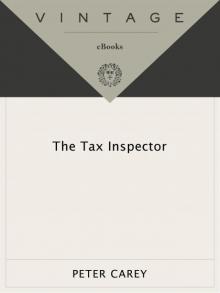 The Tax Inspector
The Tax Inspector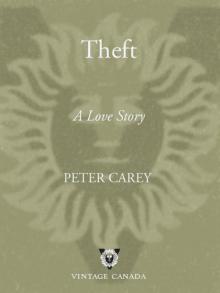 Theft: A Love Story
Theft: A Love Story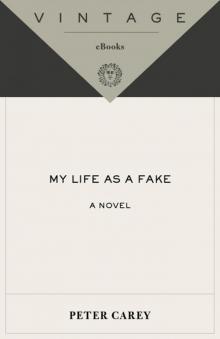 My Life as a Fake
My Life as a Fake Collected Stories
Collected Stories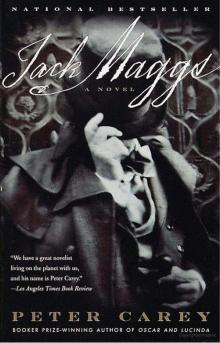 Jack Maggs
Jack Maggs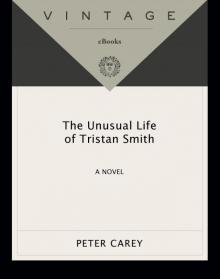 The Unusual Life of Tristan Smith
The Unusual Life of Tristan Smith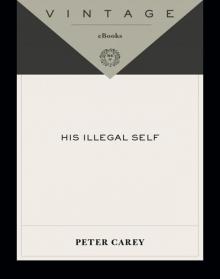 His Illegal Self His Illegal Self His Illegal Self
His Illegal Self His Illegal Self His Illegal Self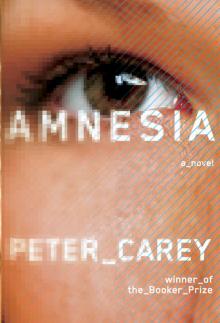 Amnesia: A Novel
Amnesia: A Novel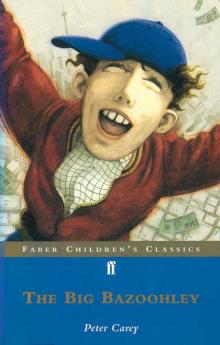 The Big Bazoohley
The Big Bazoohley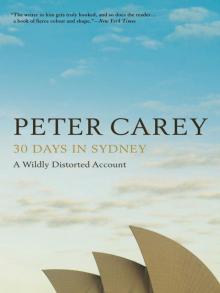 30 Days in Sydney
30 Days in Sydney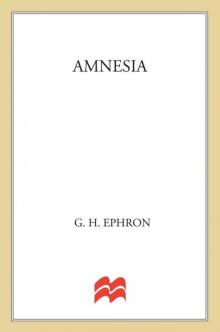 Amnesia
Amnesia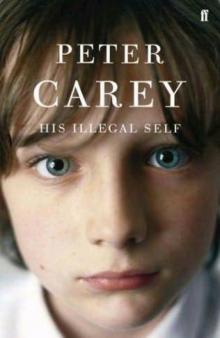 His Illegal Self
His Illegal Self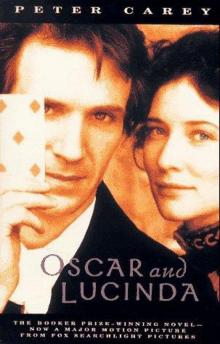 Oscar and Lucinda bw-1988
Oscar and Lucinda bw-1988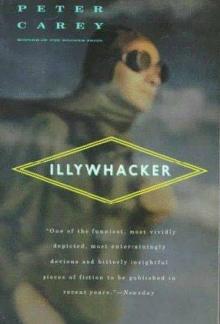 Illywhacker
Illywhacker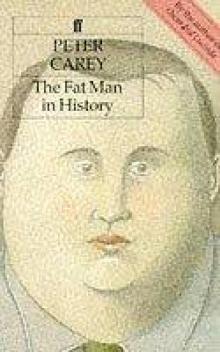 The Fat Man in History aka Exotic Pleasures
The Fat Man in History aka Exotic Pleasures